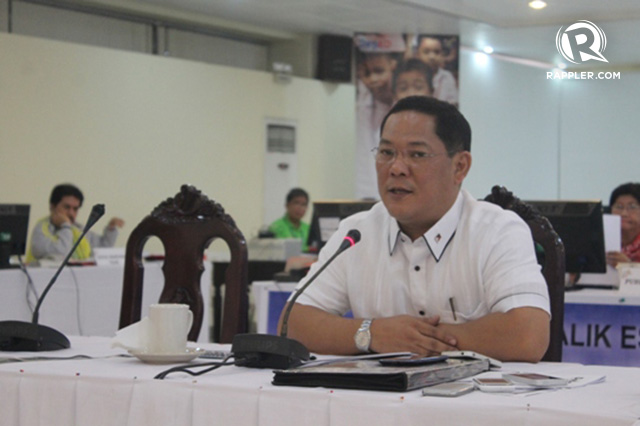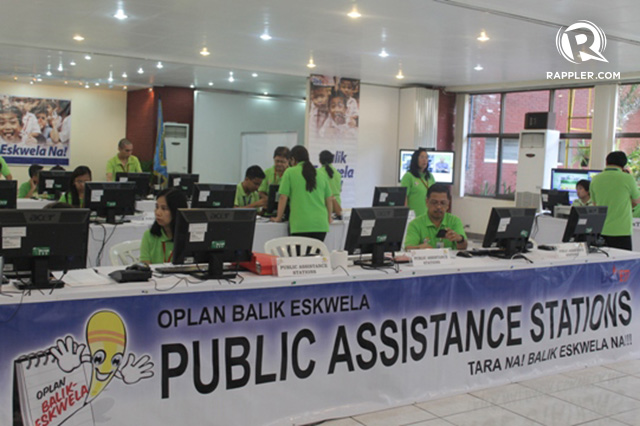SUMMARY
This is AI generated summarization, which may have errors. For context, always refer to the full article.
MANILA, Philippines – About 23 million public and private school students nationwide have enrolled for school year 2013-2014, the Department of Education (DepEd) said on Monday, May 27.
During this year’s relaunch of Oplan Balik Eskwela, DepEd Assistant Secretary Jesus Mateo told reporters that they project 20 million public school students and at least 3 million private school students to attend the opening of classes on June 3 and June 10.
This total number increased from last school year’s 21 million due to the department’s target of reaching out to marginalized groups, including out-of-school children, street children, and children in conflict with law.
Addressing shortage

Mateo also said the government has already addressed the shortage on textbooks and classroom seats since last year, with an expected 1:1 student-textbook and student-seat ratio this year.
The department also expects to eliminate before the year ends the classroom shortage of 66,800, which was recorded when the Aquino government took power in 2010,
“On December 2012, about 32,826 classrooms were built with funds not only from the government but also from private sectors. As of May 2013, [the number has increased to] 33, 926, and majority of 19,659 classrooms ongoing constructions will be overturned before the opening of classes,” he explained. In addition to this, 20,498 classrooms are still for or ongoing procurement.
But Mateo added that as the yearly enrollment increases, the shortage of classroom also increases.
Last week, Mateo went to Compostela Valley to visit the victims of Typhoon Pablo, specifically the heavily damaged barangay of Andap in the town of New Bataan. He said a temporary learning space was provided for the students while waiting for the identification of a school site along the area.
As for the teacher-student ratio, Mateo said the national ratio is 1:35, but the ratio changes when it comes to specific regions, cities and municipalities.
As of February 28 of this year, 36,923 public school teachers were hired, while 61,510 were hired last May 15 after recruitment and selection that began last year. They were hired in time for the K-12 training of grade 2 and 8 teachers.
Among the 61,510, a total of 10,000 will be teaching kinder, while 17,776 and 33,734 will be teaching elementary and high school students respectively. The number is higher for the secondary level because of field specializations.
“Aside from that, we also have what we call locally-paid teachers of about 37,000,” Mateo said, estimating that with the number of locally-paid teachers, the 145,000 shortage that existed since 2010 most likely has already been met.
Overcrowding
This year, DepEd wants to minimize triple shifting, wherein the classes start at 6 to 11am; 11am to 4pm; and 4pm to 9pm, as opposed to double shifting, wherein classes start from 7am to 11am and 1pm to 6pm.
“We can avoid triple shifting with the construction of classrooms and the hiring of teachers,” Mateo said.
He also explained how overcrowding, a phenomenon common in deeply-populated areas such as Metro Manila, Metro Cebu, and Metro Davao, can be avoided through early registration.
“The importance of early registration is that schools will have an idea of the number of enrollees. [Afterwards], we will know if we need to build a school. If there is a lack of space for school sites, we can refer them to other schools,” he said.
This year, the DepEd opened public schools for early registration last January 26. Mateo said late registrants will still be accepted, but in the event of overcrowding, will be referred to other schools nearby.
K-12
With the Enhanced Basic Education Act of 2013 or K-12 program signed into law by the President last May 15, the department opted for a gradual implementation of the program.
Last year, K-12 was already introduced into the curriculum of grade 1 and 7 students. This year, DepEd will continue with the grade 2 and 8 curriculum. In subsequent years, a higher grade curriculum both in the elementary and high school will be introduced (grades 3 and 9 in 2014; grades 4 and 10 in 2015) until the grade 11 curriculum in 2016, and grade 12 in the year after.
Mateo said that last year’s K-12 implementation showed positive evaluation despite problems that could not be avoided.

Oplan Balik Eskwela, which will run from today until June 7, will have regional and divisional command centers nationwide. The goal of the program is to help parents who still have problems regarding their children’s registration before June 3.
DepEd urged the public to register this week, if they still haven’t, to avoid problems on the first day.
“The first day should be the start of classes and the start of lessons,” Mateo said.
The department also encouraged private schools to open classes on June 10 at the latest to maintain the teacher-student contact of 200 calendar days, with 180 non-negotiable days and a 20-day leeway for school activities and the unexpected cancellation of classes. – Rappler.com
Add a comment
How does this make you feel?
There are no comments yet. Add your comment to start the conversation.